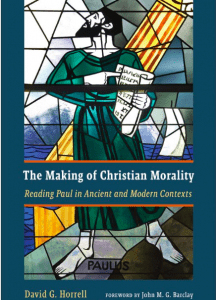 It is an interesting question not often asked How it is that one actually does Christian theology? Many pile up the Bible verses, arrange them into topics and sub-topics and topics-that-don’t-quite-fit, and then synthesize into the “biblical” view. How then does one do “biblical” theology on ethnicity or race or abortion or euthanasia or capitalism if one doesn’t have any Bible verses to add up — or not enough?
It is an interesting question not often asked How it is that one actually does Christian theology? Many pile up the Bible verses, arrange them into topics and sub-topics and topics-that-don’t-quite-fit, and then synthesize into the “biblical” view. How then does one do “biblical” theology on ethnicity or race or abortion or euthanasia or capitalism if one doesn’t have any Bible verses to add up — or not enough?
A new book opens up this conversation in informed ways: David G. Horrell, The Making of Christian Morality: Reading Paul in Ancient and Modern Contexts.
Before I get to there, a brief on this very good book.
He opens with four excellent studies of the sociohistorical context of Pauline churches — local Pauline Christians were in “ecumenical” churches not just Pauline churches, the domestic space for churches in Corinth is studied through archaeological remains, he isn’t convinced Philemon is wealthy (here his disproofs might fall to the same disproofs for his own conclusions), and he has a wonderful study on how “brothers” morphs into “house of God” in Pauline chronology — and then Horrell explores Pauline ethics in their historical context (he’s big on identity, common ethics between Christians and Corinthians, on the flexibility of Paul on idol food with attention to others, and how the famous hymn of Philippians 2 has ethical implications.
Then Horrell turns to how to do Christian ethics, exploring the communitarian ethics of Hauerwas and the liberal ethics of Habermas and how Paul provides resources for thinking about modern Christian ethics with hope for a more tolerant, liberalism ethic. Then he turns to ecological ethics, and this leads to some summary lines from his book on how Christians can use Paul for thinking with Paul for Christian ethics.
In other words, if new creation in Christ is a cosmic and not merely personal or human transformation, then the responsibilities incumbent on those who respond to the vision are cosmic in scope and not merely interpersonal; they encompass, we might say, not merely social justice but also ecojustice.
It should be clear that in this essay I have not intended to offer a proposal as to ”what Paul really said.” I am not arguing—crudely put, but in more subtle ways reflecting a stance that underpins a good deal of biblical interpretation—that Paul wanted to work for the reconciliation of the whole of creation, so we should too. Rather, I am attempting a constructive exercise in which a rereading of the Pauline tradition is explicitly shaped by the perceived priorities of the contemporary context, yet at the same time draws on and develops potential latent in the Pauline texts.
3aul may help to resource our efforts to reconfigure our vision of the world around us, and to ground a revised theology that (re)integrates humanity into solidarity with the whole community of creation—crucial tasks indeed—but neither he nor any of the biblical writers can give us substantive answers to the question as to what, in concrete terms, we then should do.











